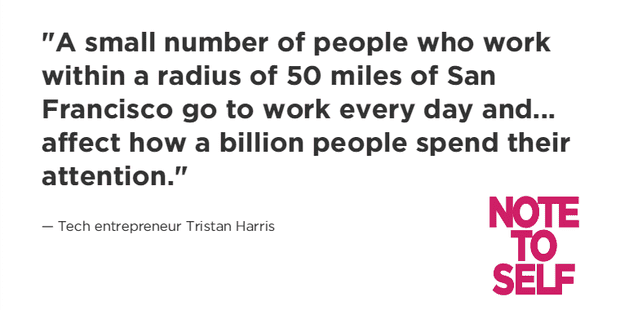QoN: What is Our Attention Actually Worth?
QoN: What is Our Attention Actually Worth?
Welcome to week three of our new segment “Question of Note,” in which we take a listener’s question — your question! — and find just the right the person to answer it. See them all here as we go along.
Here for our Clutter survey? No? Want to help shape Note to Self’s next project? Find it here.
This week’s Question of Note is a “what if.” It comes from Manoush herself, and it all started with a reflection from various luminaries of western thought: Follow the money.
Or, alternatively, “your time is money, and technology companies want to lay claim to as much of it as possible.”
The reason so many of us feel like our devices monopolize our attention comes down to one fact, says techie and design entrepreneur Tristan Harris: The people behind our technologies need to make a living (or, you know, billions of dollars). And the money-making mechanism of Silicon Valley? They have to be able to say “we kept this person’s attention on our site/app/brand for a really long time.”
It works for advertisers, but there’s a cost to us. According to research from the University of California-Irvine, every time we get interrupted by something external, it takes us about 23 minutes to refocus after the interruption. Notifications are a huge hindrance to productivity.
So Manoush’s question:
What if there was another metric of success for technology companies? What would that look like?
Harris wants to turn this into a conversation for technologists everywhere. It’s going to be a massive project. But he has some ideas.
/- Create a hierarchy of distractions. Harris uses the example of chat: What if, he says, every time you sent a chat, you had to assign it a level of importance? So “hey, I was thinking about this project that’s due in two weeks and I wanted to tell you before I forgot” wasn’t processed as an interruption, but “hey, I’m ordering lunch RIGHT now and I need to know what you want!” is. In his words: let it be “a conscious choice as opposed to an accidental or mindless interruption.”
- Build new metrics of success. As it stands, tech companies measure their success by the amount of time people spend using their services. Harris says that’s not the only option. He uses the example of Couchsurfing, a marketplace where people who had extra space could lend a couch to travelers who needed a place to crash. Back in 2007, they tried a system that rewarded the people who spent the least amount of time on their site. Harris explains: “If I was going to Paris and I was staying there for four days, they would estimate how many hours would happen in those four days between me and the person who hosts me in Paris. And then they would ask both people, ‘How positive were those hours? Did you have a good time together?’ So they’re getting kind of a count of the number of positive hours. And then what they do is subtract all of the time that both people spent on Couchsurfing’s website. They take that as a cost to people’s lives. ‘Cause having people search and send messages and look at profiles, they don’t view that as a contribution that’s positive to people’s lives. And what you’re left with is just these new net positive hours that would have never existed if Couchsurfing didn’t exist.”
- Increase public pressure on tech investors. If the people who invest in start-ups believe users are sick of notifications, they will rethink what they choose to fund. That, says Harris, is the key: Getting people to put their money behind those new metrics of success.
Listen above for more.
 (Note to Self)
(Note to Self)
As always, subscribe to Note to Self on iTunes, Stitcher, TuneIn, I Heart Radio, or anywhere else using our RSS feed.